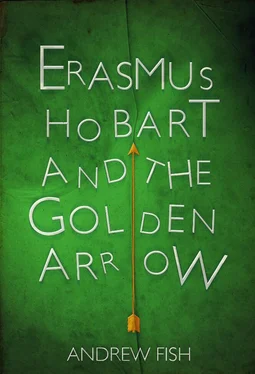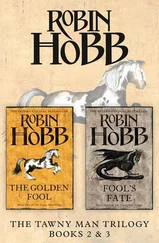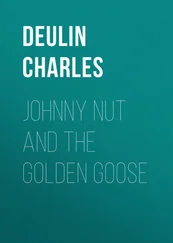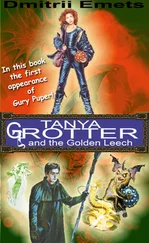He dressed hurriedly, then checked his appearance in the mirror on the inside of the wardrobe door. Perfect – except for one detail. He rummaged in a drawer at the bottom of the wardrobe and pulled out a small, cloth bag, inside which were a pair of contact lenses. He disliked wearing lenses, but his glasses were a product of a later era. Although he had no way of knowing how much impact introducing advanced technology into the ancient world would have, he didn’t want to be the man who went down in history for ruining it.
Having assured the authenticity of his costume, Erasmus examined himself in the mirror once more. He was probably a little clean for a mediaeval peasant, but that should go unnoticed for long enough for him to attract a little dirt. He practised a few mediaeval expressions, greeting himself as if he had just unaccountably run into his exact doppelganger in a village street. Then, satisfied he would pass muster, he picked up his modern clothes from where they lay on the floor and hung them up in the second wardrobe.
As he turned his jacket up the right way, the board rubber fell from its pocket and, distractedly, Erasmus attempted to put the implement back. It wasn’t so easy to insert the rubber into the pocket of a jacket he wasn’t wearing, however, and after failing on his first attempt, he popped it into the pouch he wore on his belt. He closed the wardrobe doors, then a thought occurred to him and he returned to the classroom.
Standing in the corner of the room was the bow he had confiscated from Atkinson. Erasmus picked it up and tested the string once more. He’d never fired a bow before, but it was unlikely anyone else would guess that, so carrying one would probably be a sensible measure to discourage anyone from attacking him. Finally, satisfied that he was ready to depart, Erasmus re-entered the storeroom, locking the door behind him, then turned his attention to the privy.
The interior of the privy was not what one might have expected from such a primitive device. Although the essential seat was present and correct, it was covered with a padded leather cushion, firmly fastened into place with brass studs. The walls, far from being bare wood, were covered with a mass of wires and small, blinking lights and a periscope hung from the centre of the ceiling, its brass glinting in the light from the outside world.
Erasmus sat down on the cushion, adjusted his posture to make himself comfortable, then pulled at a wooden panel that was almost flush with the wall on his right. The panel swung on smoothly oiled joints until it hung over Erasmus’ lap like one of the old-fashioned school desks in which chair and writing surface were one combined piece of furniture. The surface of this desk, however, contained something more than an inkwell, with a series of lights and liquid crystal displays, all connected to each other with lengths of rainbow-striped ribbon cable. In the centre of the panel was a series of buttons, a small keyboard, a joystick with a big red button on top and a throttle, all cobbled together from bits of old computer equipment, and these were labelled, using the black and white embossed stickers from a label maker Erasmus had confiscated from a troublesome first former. The joystick was labelled ‘where’ and the throttle was labelled ‘when’.
Erasmus flicked a switch on the side of the board and the privy hummed into life, with lights streaming along translucent wires, LEDs flicking on and off in what appeared to be random sequences and the displays on the control panel blinking a couple of times before settling down. A series of numbers appeared, the co-ordinates of Erasmus’ previous jaunt, with a prompt for a label displayed in flashing capitals beneath. The schoolteacher entered in a date and location – his research had placed Lady Godiva’s ride in Coventry somewhere between 1038 and 1051 – then pressed the button to store the information. It wasn’t, he had to admit, a very precise fix, but it was a start. He’d be able to improve on that when he’d made a few more trips.
Erasmus surveyed the control panel before him and breathed deeply. Last night had been an experiment – he had had no real destination in mind – now he was going to put his machine to the purpose he had always intended – the pursuit of historical truth. It was true he would never be able to tell anyone what he discovered – he was less than willing that his machine should fall into the hands of the authorities – but he could finally find the answers to all those questions that had nagged him throughout his life: he could finally know what really happened. He placed his hands on the joystick and the throttle, moved them carefully until he was satisfied with the contents of the display, then closed his eyes and pressed the red button.
Chapter Five Contents Title Page ERASMUS HOBART and the GOLDEN ARROW Dedication Chapter One Chapter Two Chapter Three Chapter Four Chapter Five Chapter Six Chapter Seven Chapter Eight Chapter Nine Chapter Ten Chapter Eleven Chapter Twelve Chapter Thirteen Chapter Fourteen Chapter Fifteen Chapter Sixteen Chapter Seventeen Chapter Eighteen Chapter Nineteen Chapter Twenty Chapter Twenty-one Chapter Twenty-two Chapter Twenty-three Epilogue About the Author Credits Copyright About Authonomy About the Publisher Конец ознакомительного фрагмента. Текст предоставлен ООО «ЛитРес». Прочитайте эту книгу целиком, купив полную легальную версию на ЛитРес. Безопасно оплатить книгу можно банковской картой Visa, MasterCard, Maestro, со счета мобильного телефона, с платежного терминала, в салоне МТС или Связной, через PayPal, WebMoney, Яндекс.Деньги, QIWI Кошелек, бонусными картами или другим удобным Вам способом.
The Middle Ages was once said to be a time when England was covered in an impenetrable forest, when a squirrel could cross from one end of the country to the other without once setting foot on the ground. This is now known to be untrue, though it may have been possible for squirrels that had mastered the art of hitchhiking or stowing away on carts.
For a squirrel to cross a shorter distance, say from one part of Sherwood Forest to another, was much simpler and would have been particularly easy deep in the heart of the forest where the upper branches of the trees grew so close as to blanket out the sun. Here all was suffused in a strange green light, filtering through the leaves to the ground below and this, so the peasants held, was where the spirits were said to walk and where the night came faster and deeper than in any other part of England. Here the common man feared to tread.
Guy of Gisburne was not a common man. He didn’t believe in phantoms and fairies and knew the only thing that went bump in the night was the door of the privy when the plague was in town. For him, Sherwood Forest held no ghostly fears – the only threats were outlaws. You had more chance of an arrow in your back than of having your soul stolen by whatever demons lurked in the ancient wood.
He rode quietly through the heart of the forest, or at least as close to it as he could get whilst wearing scale-mail armour and mounted on a horse. Despite his lack of supernaturally induced fear, his eyes betrayed a certain nervous tension and his feelings were somehow transmitted to his horse, which was behaving a little skittishly. A resounding clang on his helmet made him look up – above him in the trees he saw the small form of a creature scurrying away through the branches. Bloody squirrels. He hadn’t come into the woods to hunt squirrels, he’d come to hunt outlaws. Outlaws who were stealing the King’s deer and waylaying merchants whose taxes would fund his wars in the Holy Land.
Читать дальше











